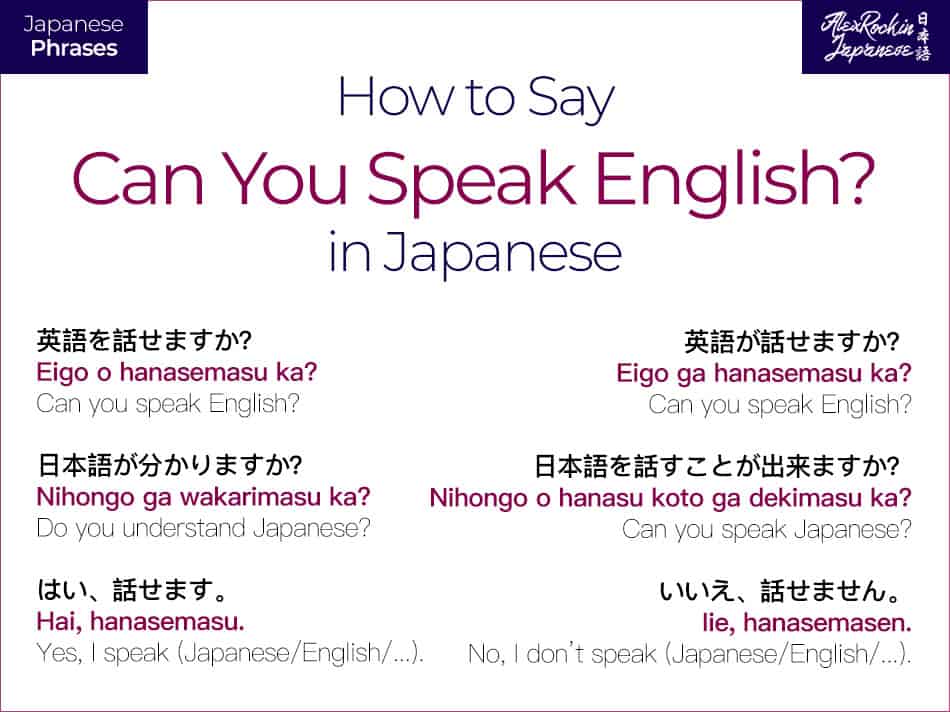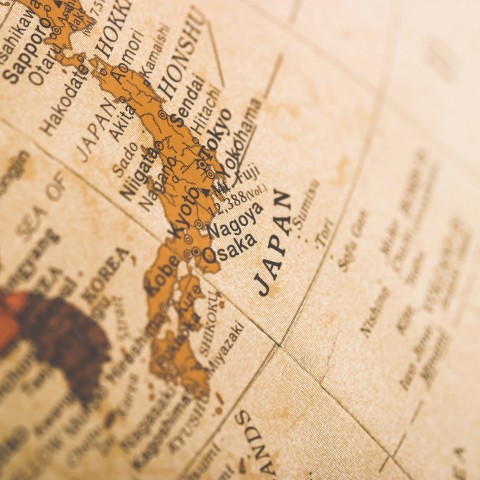If you are ever visiting Japan and run into a situation where you need some help from the locals, it helps to know how to ask them the right questions. Perhaps the most critical phrase that you learn how to say is “can you speak English” in Japanese.
It’s true that English is taught in the Japanese education system, but the overall results are similar to how Americans learn Spanish or French in class. Some people can speak fairly well, but the majority of them aren’t confident in their abilities.
By asking today’s phrase, you can at least be polite and get verification from the listener before you start asking them things in English.
The Japanese Word For English
The first thing to learn is the Japanese word for “English” which is 英語 (eigo).
The first kanji in this word is 英 (ei) which is a prefix that means Britain and the second kanji 語 (go) is a suffix that means language.
So when they are combined like this, the word literally means “the language of Britain” which of course is English.
Keep that word in mind because it will be the central one in the phrases that follow.
There are actually quite a few ways that you can ask a person is they speak a language, understand a language, etc.
But no matter which one of those forms you decide to use, you will always use 英語 with it.
How To Ask “Can You Speak?”
The dictionary form of the word “to speak” in Japanese is 話す (hanasu), but it’s best to use the polite mass-form of this verb when starting a conversation with someone you don’t know.
That means we will want to use the word 話します (hanashimasu) along with some of the right particles to form the sentence that you’re needing.
- 英語を話しますか?
- eigo o hanashimasu ka?
- Do you speak English?
Although you could use the above sentence and people would understand you, it’s probably best to use a slightly different form of the verb.
The above question feels a little more like you’re asking them if they speak English regularly, which might depend on their occupation or hobbies.
Instead, we can use 話せます (hanasemasu) which means “can speak” and would clarify that you’re inquiring about their abilities with English because you want to talk to them in it.
- 英語が話せますか?
- eigo ga hanasemasu ka?
- Can you speak English?
This question should work in most situations that you find yourself in.
If they can speak English, then they will probably switch over and start talking to you in it. If they can’t, then they will probably shake their head and tell you they can’t.
There are a couple of other ways that you can ask this same thing, and there may be times when you would rather opt to use of them. Let’s take a look at them now.
Other Ways To Ask This Question
The first new word to learn is 喋る (shaberu) which means “to talk; to chat” and is generally though of as a more casual word than 話す that we learned in the last section.
You can use it if you want, but another thing to keep in mind is that the person you’re talking to might use it in response to your question.
If they do, you’ll know what they are saying.
- 私は英語が少し喋れます。
- watashi wa eigo ga sukoshi shaberemasu.
- I can speak a little English.
(weblio)
One of the key parts of the phrases we’ve gone over has been changing the verbs into their “Potential form” which is simply the “can do” part.
But we can also just use the Japanese word 出来る (dekiru) which means “to be able to do” when it is combined with another verb.
- 日本語を話すことができる。
- nihongo o hanasu koto ga dekiru.
- I can speak Japanese.
Sometimes you will actually hear people use just the “can do” verb along with a language as a quick way of asking someone if they are able to do or use a specific language.
- 英語できますか?
- eigo dekimasu ka?
- Can you use English.
There is one last phrase that I want to cover so that you can use it when you need to.
Do You Understand English?
Sometimes you just want to ask a person if they are able to understand what you’re saying. You’re not really looking to hold an impromptu conversation with them.
If you’re really just needing to get some basic help like directions to the nearest train station than you can ask the other person if they understand English.
- すみません、英語がわかりますか?
- sumimasen, eigo ga wakarimasu ka?
- Excuse me, do you understand English?
If you ask a question like this you might get someone who understands enough English to answer your question, but even if they don’t know what you’re saying, they still might be able to figure out what you want by your non-verbal communication.
If you’ve got a map that you can point to, or the name of the place that you’re trying to find, then just showing it to the other person might be a clear enough message to get your point across.
But regardless of what happens, you now know many different ways to ask people if they know English.
Focus On The Message
You can actually get pretty far in foreign countries without knowing the language as long as you are able to communicate in other ways that people can understand.
Using pictures of what you’re looking for, or showing the names of places you’re trying to get to can help.
But even though these strategies can work, it is much more rewarding when you know enough of the local language to talk with someone and have a nice conversation.
So if you’re even planning on visiting Japan, or really any other country that uses a different language than your own, then be sure to spend some time learning basic words and phrases so that you can talk with the people you meet.
If you have any question or comments, then let me know by leaving them down below. Thanks!
0
Subjects>Arts & Humanities>Other Arts
Wiki User
∙ 5y ago
Best Answer
Copy
English = 英語 (eigo)
The English language is «eigo», or 英語. An English person would
be «eijin». Eigo rhymes with Faygo and Winnebago.
Wiki User
∙ 5y ago
This answer is:
Study guides
Add your answer:
Earn +
20
pts
Q: What is the Japanese word for English?
Write your answer…
Submit
Still have questions?
Continue Learning about Other Arts
What is the word ‘honorable’ when translated from English to Japanese?
What is the word ‘Honorable’ when translated from English to
Japanese.
What is the word ‘drag’ when translated from English to Japanese?
The word drag when translated from English to Japanese is hipparu.
What is the word ‘Lolita’ when translated from English to Japanese?
It’s exactly the same word in Japanese as in English.
What is the word ‘maple’ when translated from English to Japanese?
The word ‘maple’ when translated from English to Japanese is
カエデ.
What is the word ‘table’ when translated from English to Japanese?
The Japanese word for «table» is very similar to English:
‘teeburu’
Related questions
People also asked
Featured Questions
Can Nebraska extradite from topekaks?
Does the lithosphere contain the crust?
When the lord buddha was born in?
What century is 86 BC?
What are the names of the third leaders called?
Why fibrous material has only one falling period in drying curve?
What is the tubular passage for air?
Who made stubbies?
How do you download your XBOX 360 upgrade onto a CD?
Who has morals?
Why did the Osage Indians live in the great plains?
Do you get more time for selling weed it in your home or outside?
How many days im 3 weeks?
What does abka stand for?
How can a map enhance your understanding?
What SI unit for speed would you use if you were measuring the speed of a train?
Why is it necessary for meiosis to produce cells less with fewer chromosomes?
Which contains more carcinogens luncheon meats or grilled meats?
Were monsters true in the past?
Do they have oxygen on the Moon?
Inventor of the computer in the 1930s?
What does rising action event mean?
How do you telepathically connet with the astral plain?
What are the names of God in various Kenyan tribes?
How many credits do you need to graduate with a doctoral degree?
Ano sa filipino ang political question?
How much did the Acropolis of Athens?
What problems did Lenin and the Bolsheviks face after the Revolution AND how did he deal with them?
How did plains capture buffallos?
Where is the magnetic force the greatest on a magnet?
In today’s survival phrase lesson, we will take a look at different ways how to say “Can you speak English?” in Japanese. If you can start your conversation with a Japanese phrase like this it will help a lot not to scare away the Japanese person you would like to talk to.
To ask someone in Japanese if they can speak English you use the phrase “Eigo o hanaesmasu ka?” (英語を話せますか). “Eigo” is the Japanese word for “English” and “…o hanasemasu ka?” means “Can (you) speak …?”. To sound even politer you can add “Sumimasen” (すみません) at the beginning of the sentence.
Below you will find a couple of other ways how you can ask if someone speaks English and the possible responses you might get. I have also added the translations of a few related phrases like for example “Do you speak…?” or “I can’t speak…” and a vocabulary list with other useful words for this situation.
Now that you know the most basic phrase to ask if someone speaks English is “Eigo o hanaesmasu ka?” (英語を話せますか) in Japanese, let’s look at some other ways how you can ask this. All of the phrases below generally mean the same. They are just other natural ways how you can frame the same question.
“Can you speak English?” in Japanese
- Eigo ga hanasemasu ka?
Can you speak English?
英語が話せますか?
えいご が はなせます か? - Eigo ga wakarimasu ka?
Do you understand English?
英語が分かりますか?
えいご が わかります か? - Eigo o hanasu koto ga dekimasu ka?
Can you speak English?
英語を話すことが出来ますか?
えいご を はなすことができます か?
In order to start the conversation more politely I would always add the word “Sumimasen” (すみません) at the beginning. It means “Excuse me” and is usually used when you start talking to someone you don’t know or when you need to ask for a favor, etc. It can be added to all of the sentences mentioned above.
Ask more politely by adding “Sumimasen”
- Sumimasen, eigo o hanasemasu ka?
Excuse me, can you speak English?
すみません、英語を話せますか?
すみません、えいご を はなせます か? - Sumimasen, eigo ga wakarimasu ka?
Excuse me, can you understand English?
すみません、英語が分かりますかか?
すみません、えいご が わかります か?
If you have had Japanese lessons before or if you are taking lessons right now you might be wondering why the “Anata wa” (あなたは, you) is missing. Well, two reasons. It is not really polite to use “anata” especially when talking to a stranger and in Japanese the subject is usually omitted when it is clear. So while “Anata wa eigo o hanasemasu ka?” (あなたは英語を話せますか) is grammatically correct it is just not natural.
The most common responses you will get are probably “I don’t speak English” or “Yes“. However, just in case the person answers in Japanese you might want to know that “Hanasemasu” or “Hai/Ee hansemasu” means they can speak English. While “Hanasemasen” or “Iie, hanasemasen“, on the other hand, means they don’t speak English. You might also hear “Sukoshi hanasemasu” which means that they can speak English a little, but we will learn more about that in the next section.
Related Phrases & Useful Words
Instead of focusing on just one phrase, I thought it might be useful if we can combine it with related survival phrases. So here are a couple of other phrases that might come up in the same situation. The first one of the examples is usually an easier one for beginners, while the other ones are a bit longer and could be a bit more complicated.
Do You Speak (English/Japanese/…)?
This is very easy to remember because it is essentially the same phrase. “Eigo o hanashimasu ka?” (英語を話しますか) is the actual direct translation, but nobody says this. So just stick to the phrase we have learned a minute ago with hanasemasu (話せます).
If somebody wants to know if you speak Japanese they will ask “Nihongo o hanasemasu ka?” (日本語を話せますか). So any time you want to ask about another language just replace “Eigo” with the Japanese word for the other language.
Eigo o hanasemasu ka?
Kanji: (英語)を話せますか?
Kana: (えいご)を はなせます か?
Meaning: Do you speak (English)?
Nihongo o hanasemasu ka?
Kanji: (日本語)を話せますか?
Kana: (にほんご)を はなせます か?
Meaning: Do you speak (Japanese)?
Yes, I (Can) Speak (English/Japanese ….)
“Hai, hanasemasu” (はい、話せます) or the less natural phrase “Hai, eigo o hanasemasu” (はい、英語を話せます) mean “Yes, I speak English” or “Yes, I can speak English”. As with “you” it is clear that you are talking about “English” or the beforementioned language so there is no need to repeat that.
A very similar phrase is “… koto ga dekimasu” (…ことが出来ます) which means “can do ….” or “able to do…”. So when you say “Nihongo o hanasu koto ga dekimasu” it also means “I can speak Japanese”.
Hai, hanasemasu.
Kanji: はい、話せます。
Kana: はい、はなせます。
Meaning: Yes, I speak (English/Japanese/…).
Hai, (nihongo o) hanasemasu.
Kanji: はい、(日本語を)話せます。
Kana: はい、(にほんご を)はなせます。
Meaning: Yes, I speak (Japanese).
Hai, (eigo o) hanasu koto ga dekimasu.
Kanji: はい、(英語を)話すことができます。
Kana: はい、(えいご を)はなす こと が できます。
Meaning: Yes, I can speak (English).
No, I Don’t/Can’t Speak (Japanese/English/…)
To say that you don’t or can’t speak English you just have to change the verb hanasemasu (話せます) into its negative form which is hanasemasen (話せません). You do this by simply replacing “masu” (ます) with “masen” (ません).
In the same way, you can change other verbs like for example dekimasu (出来ます, able to do) or wakarimasu (分かります, understand) into their negative form. Let’s try it!
Iie, hanashimasen.
Kanji: いいえ、話せません。
Kana: いいえ、はなせません。
Meaning: No, I don’t speak (language).
Iie, (nihongo ga) wakarimasen.
Kanji: いいえ、(日本語が)分かりません。
Kana: いいえ、(にほんご が)わかりません。
Meaning: No, I don’t understand (Japanese).
Iie, (eigo o) hanasu koto ga dekimasen.
Kanji: いいえ、(英語を)話すことが出来ません。
Kana: いいえ、(えいご を)はなす こと が できません。
Meaning: No, I can’t speak (English).
I Can Speak a Little (Japanese/English/…)
You can say this by using “Sukoshi dake nihongo o hanasemasu” (少しだけ日本語を話せます). Sukoshi (少し) means “a little” or “a bit” and dake (だけ) means “only” or “just” so when combined Sukoshi dake it emphasizes “just a little” or “only a bit”.
Sukoshi dake nihongo o hanasemasu.
Kanji: 少しだけ日本語を話せます。
Kana: すこし だけ にほんご を はなせます。
Meaning: I can speak a little Japanese.
Sukoshi dake nihongo o hanasu koto ga dekimasu.
Kanji: 少しだけ英語を話すことが出来ます。
Kana: すこし だけ えいご を はなす こと が できます。
Meaning: I can speak only a bit of Japanese.
I’m sorry, I Only Speak (English/Japanese/…)?
To respond a little bit politer in case you can’t speak or understand a language you can use the phrase “Sumimasen, eigo shika hanasemasen” (すみません、英語しか話せません) which means “I’m sorry, I (can) only speak English”. Shika (しか) means “only” or “nothing but” and it is always used together with a negative form like for example “masen”. There are also some other even politer phrases to say “I’m sorry”, but let’s stick with Sumimasen for now.
Sumimasen, eigo shika hanasemasen.
Kanji: すみません、英語しか話せません。
Kana: すみません、えいご しか はなせません。
Meaning: I’m sorry, I only speak English.
Sumimasen, nihongo shika wakarimasen.
Kanji: すみません、日本語しか分かりません。
Kana: すみません、にほんご しか わかりません。
Meaning: I’m sorry, I only understand English.
I’m sorry, Can You Say This in (English/Japanese/…)?
If you want someone to repeat what they just said in English you can say “Sumimasen, eigo de itte moraemasu ka?” (すみません、英語で言ってもらえますか). Itte (言って) is the te-form of the verb iu (言う, to say) and Moraemasu (もらえます) comes from the polite verb Morau (もらう, to receive, to get someone to do something) and means “can you (do …) for me”. So, in this case, it means “can you say … for me”. Eigo de (英語で) translates as “in English”.
You can also combine it with the phrase Mou ikkai (もう一回, one more time). So “Sorry, can you say this one more time in English?” is “Sumimasen, mou ikkai eigo de itte moraemasu ka?” (すみません、もう一回英語で言ってもらえますか) in Japanese.
Sumimasen, eigo de itte moraemasu ka?
Kanji: すみません、(英語)で言ってもらえますか?
Kana: すみません、(えいご) で いって もらえます か?
Meaning: I’m sorry, can you say this in English?
Sumimasen, mou ikkai eigo de itte moraemasu ka?
Kanji: すみません、もう一回(英語)で言ってもらえますか?
Kana: すみません、もう いっかい(えいご) で いって もらえます か?
Meaning: I’m sorry, can you say this one more time in English?
Useful Words & Vocabulary List
| to speak | 話す はなす |
hanasu |
| can speak | 話せます はなせます |
hanaseru |
| can’t speak | 話せません はなせません |
hanasemasen |
| to understand | 分かる わかる |
wakaru |
| understand can understand |
分かります わかります |
wakarimasu |
| don’t understand can’t understand |
分かりません わかりません |
wakarimasen |
| to be able to do | 出来る できる |
dekiru |
| able to do | 出来ます できます |
dekimasu |
| not able to do | 出来ません できません |
dekimasen |
| to talk | 喋る しゃべる |
shaberu |
| can talk | 喋られます しゃべられます |
shaberaremasu |
| can’t talk | 喋られません しゃべられません |
shaberaremasen |
| to say | 言う いう |
iu |
| English (language) | 英語 えいご |
eigo |
| Japanese (language) | 日本語 にほんご |
nihon-go |
| Spanish (language) | スペイン語 スペインご |
supein-go |
| Portuguese (language) | ポルトガル語 ポルトガルご |
porutogaru-go |
| German (language) | ドイツ語 ドイツ語 |
doitsu-go |
| Italian (language) | イタリア語 イタリアご |
itaria-go |
| Dutch (language) | オランダ語 オランダご |
oranda-go |
| Russian (language) | ロシア語 ロシアご |
roshia-go |
| Chinese (language) | 中国語 ちゅうごくご |
chuugoku-go |
| Korean (language) | 韓国語 かんこくご |
kankoku-go |
| Hindi (language) | ヒンディー語 ヒンディーご |
hindii-go |
| Arabic (language) | アラビア語 アラビアご |
arabia-go |
| Bengali (language) | ベンガル語 ベンガルご |
bengaru-go |
| Lahnda (language) | ラフンダー語 ラフンダーご |
rafundaa-go |
How do I say “Do you speak English” in Japanese to a hotel staff?
Answer by Japanese teacher

(1) 英語(えいご)が話(はな)せますか。
Eigo ga hanasemasu ka.
Can you speak English?
(2) 英語(えいご)がわかりますか。
Eigo ga wakarimasu ka.
Do you understand English?
Explanation
In the first expression, the word 話(はな)せます hanasemasu comes from “話(はな)す hanasu” (to speak). In the second expression, わかります wakarimasu means “to understand”. Both expressions can be used to mean “do you speak English”. It would be good to add すみません sumimasen (excuse me) in front of both expressions to be polite.

The Japanese language can be very difficult for English speakers to learn as these two languages are completely different in every aspect: origin, writing system, grammar, and phonetics. But when it comes to vocabulary, you may be surprised to hear that this isn’t really the case. There are actually quite a few English loanwords in Japanese!
There’s even a name for the mixing of these two languages: Japanglish.
Some of the English words used in Japanese have the same meaning as the original ones, while others have been localized and modified (often shortened), combined with Japanese words, and/or used with a completely different meaning.
In this article, we’ll introduce English words that are commonly used in Japanese. Although you may find some of them very weird, learning Japanglish is one of the easiest parts of learning Japanese and it will be helpful in your language studies.
There is a lot of Japanglish vocabulary used in Japan.
Table of Contents
- Introduction to Japanglish
- Typical English Loanwords in Japanese
- Japanglish Wasei Eigo
- How to Say These Names in Japanese
- English Words Borrowed From Japanese
- How JapanesePod101 Can Help You Learn More Japanese
1. Introduction to Japanglish
There are two types of English words used in the Japanese language: loanwords and Wasei-Eigo. Let’s take a closer look at each group.
Loanwords Used in Japanese
Loanwords, or 外来語 (gairai-go), are commonly used in modern Japanese. After two centuries of isolation, called 鎖国 (Sakoku), Japan became “open” to foreign countries in the mid-nineteenth century. This new status brought with it influences from Western cultures, and many of the first loanwords in Japan came from Portuguese, Dutch, French, and German. English loanwords started to gain prevalence during the post-World War II period. Since then, Japanglish has continued to evolve and grow in popularity.
While the younger Japanese generations often use loanwords without even realizing they’re originally from foreign languages, the older population hardly uses or understands them.
The most basic loanwords are English words used in Japanese with the same meaning, but with Japanese pronunciation. Examples include:
- カメラ (kamera) – “camera”
- タクシー (takushī) – “taxi”
- クリック (kurikku) – “click”
You have to keep in mind that loanwords are normally written with カタカナ (Katakana) letters and follow Japanese pronunciation rules. Also, when they’re written in alphabet form using ローマ字 (Roma-ji), or the romanization of Japanese, the spelling is often different from that of the original English words. This is because they’re transcribed according to how the Japanese read and pronounce words.
For example, all of the consonants in Japanese end with a vowel (あ a, い i, う u, え e, お o). In addition, since there’s no particular distinction between L and R in Japanese, all of the “L” sounds in English are expressed using “R” in Japanese. Thus, “click” is expressed as kurikku in Japanese.
To learn more about Japanese pronunciation, please see our “Japanese Pronunciation” article!
カタカナ (Katakana) characters are used to write loanwords.
Japanglish Wasei-Eigo: English Made in Japan
There are also English words used in Japanese that have been more fully integrated into the language. These are called 和製英語 (Wasei Eigo), or literally, “English made in Japan.”
Wasei Eigo refers to English words adopted into Japanese with unique meanings, word combinations, and/or abbreviations only used in Japan. Examples include:
- サラリーマン (sararīman)
- from “salaryman,” meaning “businessman who works at a company and gets a monthly salary”
- シャーペン (shāpen)
- short for “sharp pencil,” meaning “mechanical pencil”
サラリーマン (sararīman), or “salaryman” meaning “businessman,” is one of the most typical Japanglish words.
2. Typical English Loanwords in Japanese
These loanwords have the same meaning as their English counterparts and are commonly used in daily Japanese conversations.
| Loanword | Roma-ji / Reading | English Word |
| グラス | gurasu | glass |
| スプーン | supūn | spoon |
| フォーク | fōku | fork |
| ナイフ | naifu | knife |
| ビール | bīru | beer |
| ワイン | wain | wine |
| バス | basu | bus |
| バイク | baiku | (motor) bike |
| コンピューター | conpyūtā | computer |
| インターネット | intānetto | internet |
| ウェブサイト | webusaito | website |
| ホテル | hoteru | hotel |
| レストラン | resutoran | restaurant |
| テーブル | tēburu | table |
| サービス | sābisu | service |
| エレベーター | erebētā | elevator |
| ドア | doa | door |
| サイズ | saizu | size |
| シャツ | shatsu | shirt |
| ネクタイ | nekutai | necktie |
| サンダル | sandaru | sandal |
| サングラス | sangurasu | sunglasses |
| テスト | tesuto | test |
Words that are associated with Western-style restaurants are often used as loanwords in Japanese. These include レストラン (resutoran) – “restaurant” / ナイフ (naifu) – “knife” /ワイン (wain) – “wine.”
3. Japanglish Wasei Eigo
Learning Wasei-Eigo may be a bit more difficult, as these words and phrases have undergone alterations during their journey into the Japanese language. In this section, we’ll give you several Japanglish examples and explain them in more detail as needed.
English Words Used With Different Meanings
| Wasei Eigo | Roma-ji / Reading | English Word | Meaning |
| マンション | manshon | mansion | apartment (bigger building than アパート) |
| アパート | apāto | apart | apartment (smaller building than マンション) |
| コンセント | consento | consent | electrical outlet
Many Japanese people use the word “consent” to mean “electrical outlet.” It is said that it originates from the word “concentric plug.” |
| メイク | meiku | make | makeup |
| リンス | rinsu | rinse | hair conditioner |
| アイス | aisu | ice | ice cream |
| ホットケーキ | hotto kēki | hot cake | pancake |
| スーパー | sūpā | super | supermarket |
| レジ | reji | register | It originally comes from “cash register,” meaning “checkout counter” or “cashier.” |
| ファイト! | faito! | fight | This word is used to cheer someone up. It can mean “Hang in there,” “You can do it,” or “Do your best.” |
| ハイテンション | hai tenshon | high tension | very excited / hyper |
| テキスト | tekisuto | text | textbook / school manual |
| カンニング | kanningu | cunning | cheating on an exam |
| タレント | tarento | talent | television personality / entertainer |
Examples
- 次の試合は必ず勝つよ!ファイト!
Tsugi no shiai wa kanarazu katsu yo! Faito!
“You will definitely win the next match! Do your best!”
- 彼は昨日なぜかとてもハイテンションでした。
Kare wa kinō naze ka totemo hai tenshon deshita.
“He was very excited yesterday for some reason.”
- あなたの一番好きなタレントは誰ですか。
Anata no ichi-ban suki na tarento wa dare desu ka.
“Who is your most favorite TV personality?”
ホットケーキ (hotto kēki), or “hot cake,” means “pancake” in Japan.
Abbreviated Word Combinations
In Japanese, it’s common for two or more English words to be shortened into one word (usually with four syllables). Let’s see some examples.
| Wasei Eigo | Roma-ji / Reading | English Word | Meaning / Description |
| リモコン | rimokon | remote controller | remote controller
In Japanese, the first syllables from each word are combined. |
| マスコミ | masukomi | mass communication | mass communication / mass media / the press / journalism |
| エアコン/ クーラー | eakon / kūrā | air conditioner / cooler | air conditioner
クーラー (kūrā), or “cooler,” is also commonly used to mean “air conditioner.” |
| パソコン | pasokon | personal computer | computer
Along with コンピューター (conpyūtā), パソコン (pasokon) is also commonly used when talking about computers. |
| コンビニ | konbini | convenience store | This word refers to convenience stores that are open 24 hours a day and seen everywhere throughout Japan. |
| イメチェン | imechen | image change | This refers to changing one’s image, especially in terms of one’s hairstyle or clothing. |
| OL (オーエル) | ōeru | office lady | Similar to “salaryman,” this word refers to a woman who works at an office. This word is also an abbreviation. |
| CM (シーエム) | shīemu | commercial message | commercial
This abbreviation is used to mean “commercial” in Japanese. |
| BGM (ビージーエム) | bījīemu | background music | This refers to background music, especially when it’s played in a store, cafe, restaurant, etc. |
Examples
- 昨日私の古いパソコンが壊れました。
Kinō watashi no furui pasokon ga kowaremashita.
“Yesterday, my old computer broke.”
- イメチェンしたいなら髪型を変えるのが一番だよ!
Imechen shitai nara kamigata o kaeru no ga ichi-ban da yo!
“If you want to change your image, it’s best to change your hairstyle!”
- あのカフェのBGMはジャズがかかっていておしゃれです。
Ano kafe no bījīemu wa jazu ga kakatte ite oshare desu.
“That cafe plays jazz as background music and it’s fashionable.”
リモコン (rimokon) is an abbreviation of “remote controller.”
Words That Combine English and Japanese
Wasei Eigo can also get creative, with some words being a combination of an English loanword and a Japanese word.
| Wasei Eigo | Roma-ji / Reading | Composition of Words | Meaning |
| 省エネ | shōene | 省 (Kanji that represents “save”) + energy | energy-saving |
| 軽トラ | keitora | 軽 (Kanji that represents “light”) + truck | light (engine) truck / small truck |
| ガス欠 | gasuketsu | gas + 欠 (Kanji that represents “lack”) | running out of gasoline (petrol) |
| 懐メロ | natsumero | 懐 (Kanji that represents “nostalgic”) + melody | nostalgic song / all-time favorite song |
| ドタキャン | dotakyan | 土壇場 (dotanba), meaning “last moment” + cancellation | cancellation at the last moment |
| イタ飯 | itameshi | Italian + 飯 (meal/food) | Italian food |
| 猛ダッシュ | mōdasshu | 猛 (Kanji that represents “fierce” / “intense” / “acute”) + dash | sprint / run as fast as one can |
Examples
- 新しい冷蔵庫は省エネモデルです。
Atarashii reizōko wa shōene moderu desu.
“The new refrigerator is an energy-saving model.”
- ガス欠により道の真ん中で車が止まった。
Gasuketsu ni yori michi no mannaka de kuruma ga tomatta.
“The car stopped in the middle of a road due to running out of gasoline.”
- まりこはいつもデートをドタキャンする。
Mariko wa itsumo dēto o dotakyan suru.
“Mariko always cancels a date at the last moment.”
Loanwords Turned Into Japanese Verbs
By adding the Japanese word する (suru), or “to do,” after a loanword (whether it’s a noun or a verb), it becomes a verb in Japanese.
| Wasei Eigo | Roma-ji / Reading | Composition of Words | Meaning |
| ドライブする | doraibu suru | drive + suru | to go for a drive |
| ノックする | nokku suru | knock + suru | to knock |
| キャンセルする | kyanseru suru | cancel + suru | to cancel |
| ジョギングする | jogingu suru | jogging + suru | to jog |
| リラックスする | rirakkusu suru | relax + suru | to relax |
| ジャンプする | janpu suru | jump + suru | to jump |
| キスする | kisu suru | kiss + suru | to kiss |
| メイクする | meiku suru | make + suru | to put on makeup |
| パーティーをする | pātī o suru | party + o + suru | to party |
| ギャンブルする | gyanburu suru | gamble + suru | to gamble |
Examples
- 私はお風呂に入ってリラックスするのが好きです。
Watashi wa o-furo ni haitte rirakkusu suru no ga suki desu.
“I like to take a bath and relax.”
- 私たちは週末に誕生日パーティーをする予定です。
Watashi-tachi wa shūmastu ni tanjōbi pātī o suru yotei desu.
“We plan to have a birthday party over the weekend.”
- 入る前にドアをノックしてください。
Hairu mae ni doa o nokku shite kudasai.
“Please knock on the door before entering.”
To learn all about conjugation in Japanese, please see our article on Japanese Verb Conjugations.
パーティーをする (pātī o suru) – “to party”
4. How to Say These Names in Japanese
In Japan, world-famous brand names are pronounced according to Japanese pronunciation rules and are sometimes called something different. Here are a few examples.
- Google: グーグル (Gūguru)
- Apple: アップル (Appuru)
- Starbucks: スターバックス (Sutābakkusu)
A shortened version, スタバ (Sutaba), is commonly used in daily conversations.
- Kentucky Fried Chicken: ケンタッキー フライド チキン (Kentakkī furaido chikin)
There are also a couple of shortened versions often used in daily conversations: ケンタッキー (Kentakkī) and ケンタ (Kenta).
- McDonald’s: マクドナルド (Makudonarudo)
Depending on the region of Japan, there are different shortened versions for this brand name.
- ➢ Kanto (Tokyo, Chiba, Saitama, Kanagawa) and other regions: マック (Makku)
➢ Kansai region (around Osaka, Kyoto, Nara, Hyogo, etc.): マクド (Makudo)
There are even different dialect forms for “McDonald’s” in Japanese!
5. English Words Borrowed From Japanese
Due to globalization, there are also plenty of popular Japanese words in English! Let’s look at a few of these borrowed words:
| Food-Related Words | Kanji / Hiragana | Meaning / Description |
| Sushi | 寿司 / すし | Sushi is a famous Japanese food, consisting of vinegared rice and raw and/or cooked seafood. |
| Teriyaki | 照り焼き / てりやき | Teriyaki is a Japanese cooking technique and flavor. Foods are broiled or grilled with a glaze of sauce made of soy sauce, mirin, and sugar. 照り(teri) refers to a shine/luster and 焼き (yaki) means “grill.” |
| Tofu | 豆腐 / とうふ | Tofu is bean curd made of soybeans. The Japanese word Tofu originates from the Chinese word 豆腐 (dòufu), which literally means 豆 (“bean”) + 腐(“curdled” or “fermented”). |
| Edamame | 枝豆 / えだまめ | Edamame is a dish of immature soybeans, usually boiled and salted. |
| Sake | 酒 / さけ | Sake literally means “alcoholic drink” in Japanese, but it often refers to Japanese rice wine, or 日本酒 (Nihonshu). |
| Matcha | 抹茶 / まっちゃ | Matcha refers to green tea leaves that have been finely ground into a powder. Green tea leaves for Matcha are grown and processed using a specific method. |
| Bento | 弁当 / べんとう | Bento is a reusable lunch box that can contain a single-portion meal, usually consisting of rice and some sides. |
| Culture-Related Words | Kanji / Hiragana | Meaning / Description |
| Bonsai | 盆栽 / ぼんさい | Bonsai is an artform of planting that uses cultivation techniques to produce small trees in containers. Bonsai literally means “tray planting.” |
| Origami | 折り紙 / おりがみ | Origami is the art of folding papers, usually done with square papers that have color on one side and white on the other side. Origami breaks down as:
折り(ori) – “fold” + 紙 (kami/gami) – “paper” |
| Emoji | 絵文字 / えもじ | Emoji is a type of pictograph that is used in electronic messages, originally invented in Japan. Emoji breaks down as:
絵 (e) – “picture” + 文字 (moji) – “character” |
| Manga | 漫画 / まんが | Manga refers to Japanese-style comics that are often animated. |
| Cosplay (Kosupure) | コスプレ | The word コスプレ (Kosupure) comes from “costume play.” It is a type of performance art in which participants (cosplayers) dress up as characters from their favorite manga or anime. |
| Karaoke | カラオケ | Karaoke is a shortened version of 空 (kara), meaning “empty,” and オーケストラ (ōkesutora), meaning “orchestra.”
It is a form of entertainment where an amature sings popular songs using a microphone, following along with the instrumental music/melody and lyrics displayed on a video screen. |
| Sudoku | 数独 / すうどく | Sudoku is a logic-based number-placement puzzle. The word 数独 (Sudoku) is an abbreviation that means “number” + “single,” coming from the rule of this puzzle: “the digits must be single” or “the digits are limited to one occurrence.” |
| Other Famous Words | Kanji / Hiragana | Meaning / Description |
| Kaizen | 改善 / かいぜん | 改善 (Kaizen) is literally translated as “improvement.” Kaizen in English often refers to “continuous improvement” in business atmospheres. It became known as the Japanese way of doing business to optimize processes and produce better results. |
| Karoshi | 過労死 / かろうし | 過労死 (Karoshi) literally means “death of overwork.” It refers to death as the result of mental and/or physical illness from working too much or being under too much pressure. |
| Tsunami | 津波 / つなみ | 津波 (Tsunami) literally means “port wave.” It is a series of huge waves, usually in an ocean. A Tsunami can be caused by earthquakes, volcanic eruptions, and other underwater explosions. |
| Typhoon | 台風 / たいふう | A Typhoon is a huge tropical cyclone that can be seen in the Northern Hemisphere, in the region called the Northwestern Pacific Basin. The Japanese word 台風 (taifū) became the English “typhoon.” |
Tsunami (津波) is one of the most famous Japanese words that was adapted into English.
How JapanesePod101 Can Help You Learn More Japanese
In this article, we introduced English words used in Japanese. We covered the history of loanwords in Japan and how Japanglish developed, basic loanwords from English and various types of Wasei Eigo, as well as famous Japanese words in English. While some Japanglish terms sound funny and weird, they are definitely helpful to learn and can help you understand Japanese better!
Did you learn anything new about Japanese today? Are there any important words or terms you know about that we didn’t include? Let us, and your fellow language learners, know in the comments!
If you would like to learn more about the Japanese language and culture, you’ll find a lot more helpful content on JapanesePod101.com. We provide a variety of free lessons to help you improve your Japanese language skills. For example, you can view the following vocabulary lists to learn the very basics of Japanese:
- 100 Most Common Nouns
- 50 Most Common Verbs
- 50 Most Common Adjectives
You can also take advantage of our personal one-on-one coaching service, MyTeacher, when you subscribe to a Premium PLUS membership. Your private teacher will help you practice pronunciation and give you personalized feedback and advice to help you improve efficiently.
And there is so much more we have to offer you! Learn Japanese faster and enjoy studying with JapanesePod101.com!

A Japanese friend once said to me, “If you want to speak like us, it’s not enough to just learn Japanese. You have to relearn English, too.”
While the reality is perhaps not quite that extreme, it is true that there are a ton of English words and phrases used in a uniquely Japanese way. These words, called gairaigo (外来語), or ‘words of foreign origin’, are not only pronounced in a Japanese way that the average English speaker wouldn’t understand, but often have entirely different meanings as well.
There are even some completely made up ‘English’ words and phrases, called wasei eigo (和製英語, or ‘Japan-made English’) that have somehow made their way into the Japanese language. Japanese people tend to assume gairaigo and wasei eigo are ‘real’ English, and are often surprised to find they are actually unintelligible to native English speakers.
The amount of gairaigo and wasei eigo in existence is a bit overwhelming, but here are a few of the most common and/or most interesting examples.
ノートパソコン (nooto pasokon): laptop computer
Japanese people seem to like to take long English words, ‘Japanify’ their pronunciation, and then shorten them, as they have done with the two words that make up this combo: ノート, short for ノートブック, or ‘notebook’; and パソコン, short for パーソナルコンピュータ, or ‘personal computer’. ノート and パソコン are the words most commonly used in Japanese for ‘notebook’ and ‘computer’ respectively. A laptop is a computer that folds up like a notebook, so it’s called a ノートパソコン. Makes sense, right?
ノートパソコンはどこにも持っていけるから便利ですね。
Nooto pasokon wa doko ni mo motte ikeru kara benri desu ne.
Laptops are convenient because you can take them anywhere.
クレーム (kureemu): complaint
Here’s an example of a word that’s come to mean something completely different than it does in English. クレーム is a Japanification of the word ‘claim’, and for some reason it means ‘complaint’. It’s most commonly used to refer to a complaint made by a customer to a business.
今日はお客さんからクレームばっかりでしんどいです。
Kyou wa okyakusan kara kureemu bakkari de shindoi desu.
I’m getting nothing but complaints from customers today, and it’s so tiring.
サラリーマン (sarariiman) and OL (ooeru): male and female office workers
Male office workers (you know, the ones who commute to work every morning on the train in their suits and ties) are called サラリーマン (from ‘salary man’) and their female counterparts are called OL (an abbreviation of ‘office lady’).
東京のサラリーマンやOLは満員電車の通勤で大変です。
Toukyou no saraiiman ya ooeru wa man’in densha no tsuukin de taihen desu.
It’s tough for Tokyo office workers having to commute on crowded trains.
コンセント (konsento): wall outlet; socket
This comes not from the English ‘consent’ as you might think, but rather from ‘concentric plug’, which was an old device consisting of an outlet and a plug. Eventually, that device was phased out and an outlet without a plug came to be referred to as a コンセント.
空港にコンセントが足りなくて困っている旅客がたくさんいます。
Kuukou ni konsento ga tarinakute komatteiru ryokyaku ga takusan imasu.
A lot of travelers are inconvenienced by the lack of outlets in airports.
ホッチキス, or ホチキス (hocchikisu, or hochikisu): stapler
No one seems to be entirely sure where this one came from. Some sources claim a man with the surname Hotchkiss invented the stapler, while others say Mr. Hotchkiss actually invented the machine gun and had his name attributed to the stapler in Japan by some sort of fluke.
ホッチキス貸してください。
Hocchikisu kashite kudasai.
Lend me a stapler, please.
カンニング (kannningu): cheating
This word comes from the English ‘cunning’. In Japanese it’s used as a noun rather than an adjective, and means ‘cheating’. You can also add する to the end of it to make a verb meaning ‘to cheat’.
テストでカンニングする人は零点になります。
Tesuto de kanningu suru hito wa reiten ni narimasu.
Anyone who cheats on the test will get a zero.
タレント (tarento): celebrity
From the English ‘talent’, this gairaigo actually refers to a uniquely Japanese type of celebrity who may or may not really have any talent in particular, but appears on variety shows doing all sorts of things to entertain people.
一番好きなタレントは誰? 私はベッキーが好き!
Ichiban suki na tarento wa dare? Watashi wa Bekkii ga suki!
Who’s your favorite celebrity? I like Becky!
サイン (sain): autograph
From the English ‘sign’, this refers not to a signature but to an autograph (of the sort you might get from a タレント). It can also be made into a verb with する.
人気タレントにサインしてもらった!
Ninki tarento ni sain shite moratta!
I got an autograph from a popular celebrity!
マイペース (mai peesu): one’s own pace
Unlike what it might sound like in English, it should be noted that the term マイペース generally has a negative connotation (as in the example below).
There are also some other wasei eigo phrases that use the English ‘my’ to mean ‘one’s own’: namely マイカー (mai kaa), meaning ‘one’s own car’, マイホーム (mai hoomu), meaning ‘one’s own home’, and even マイ箸 (maihashi), meaning ‘one’s own chopsticks (to be carried around for eating on the go)’.
あの人はいつもマイペースで適当だから昇進できないんだよ。ちょっと努力してれば今のところ成功しててマイホームも持ってるはずなのに。
Ano hito wa itsumo mai peesu de tekitou dakara shoushin dekinai n da yo. Chotto doryoku shitereba ima no tokoro seikou shitete mai hoomu mo motteru hazu nanoni.
That guy can’t get promoted because he’s always going at his own pace and doesn’t take things seriously. If he had put in some effort, he would be successful and even own a home by now.
ワンピース (wan piisu): a dress
A ‘one piece’ in Japanese is not a type of bathing suit, but a dress. (That is unless we’re talking about the popular anime One Piece, in which case it means something else entirely.) It does make sense, since a dress is an alternative to a ‘two piece’ ensemble of a shirt and a skirt.
このワンピース買おうかな? ちょっと高いけど、すごくかわいいから!
Kono wan piisu kaou kana? Chotto takai kedo, sugoku kawaii kara!
I wonder if I should buy this dress? It’s a bit expensive, but it’s so cute!
There are of course many more gairaigo and wasei eigo than the ones listed here, but these should give you a start! What other gairaigo or wasei eigo have you come across? Do you have any favorites?
Cover image by Gwydion M. Williams.














